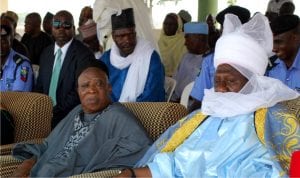Business
C’River Votes N1.7bn For Food Bank Commission

President, National Agricultural Foundation/Chairman Senate Committee on Agriculture, Senator Abdullahi Adamu (left) with Sarkin Keffi III, Alhaji Shehu Yamusa, at the 2016 National Agricultural show in Keffi, Nasarawa orecently.
The Cross River Gov
ernment has budgeted the sum of N1.7 billion for the establishment of a food bank commission in the state.
This was disclosed by the State Governor, Professor Ben Ayade, while receiving a delegation from HB Heritage Bank led by its Coordinator of the Home Grown School Feeding Programme, Mr. Godwin Ukwat on a courtesy visit in his office in Calabar, Monday.
Ayade said that the Food Bank Commission is structured in a manner that each local government will have a director.
He expressed the willingness of the state government to key into the Home Grown School Feeding Programme on the condition that it is given the free hand to run it.
The governor decried the fact that the practice of agriculture in the country was still at the subsistence level; stating that it was time the country embraced the use of technology in farming.
“We are at a time where agriculture is driven by technology in developed countries; where farming is in the hands of big farmers and infrastructure such as roads, water and power are provided,” he stated.
He argued that it would be counterproductive to encourage farmers to continue with “stone-age” agricultural practices which do not even provide insurance cover for the farmers.
In his presentation, the HB Heritage Bank, Head of Agric-Finance, Mr. Gbenga Awe, said that the home grown school feeding programme is one of the social safety nets of the Federal Government, which seeks to employ 300,000 youths in the country.
He disclosed that the programme is meant to feed school pupils from primary one to six with the aim to encourage learning, asserting that it is usually difficult for a child to concentrate and learn with an empty stomach.
Awe further explained that the scheme would be funded on the basis of 60 per cent for the federal government and 40 per cent for the state governments.
He outlined the benefits to states to include a boost to Internally Generated Revenue as it brings a large population of persons from the informal sector to the formal sector thereby expanding the state access to the tax base.
He listed states that are already signed on to the programme to include, Kaduna, Zamfara, Osun, Oyo, Jigawa, Benue and Enugu states.
Business
Two Federal Agencies Enter Pack On Expansion, Sustainable Electricity In Niger Delta

Business
Why The AI Boom May Extend The Reign Of Natural Gas

Business
Ogun To Join Oil-Producing States ……..As NNPCL Kicks Off Commercial Oil Production At Eba

-

 Sports2 days ago
Sports2 days ago2026 WC: Nigeria, DR Congo Awaits FIFA Verdict Today
-

 Environment2 days ago
Environment2 days agoOxfam, partners celebrate 5 years of climate governance programmes in Nigeria
-
Politics2 days ago
ADC, PDP, LP Missing As INEC Set For By- Elections In Rivers
-
Politics2 days ago
FG’s Economic Policies Not Working – APC Chieftain
-

 Politics2 days ago
Politics2 days ago2027: Diri Unveils RHA LG Coordinators, APC Congress Panel
-

 Politics2 days ago
Politics2 days agoReps To Meet,’Morrow Over INEC’s 2027 Election Timetable
-

 Politics2 days ago
Politics2 days agoGroup Continues Push For Real Time Election Results Transmission
-
Sports2 days ago
Sunderland Overcome Oxford Challenge

